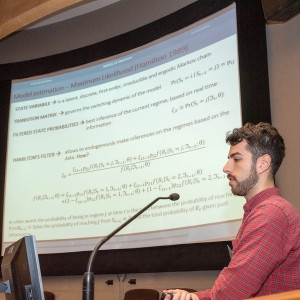Chapters
So far, it's been a rough year. So far? The year is nearly over and it has been far more than rough! If you so scoff, you are perfectly right.
This year has seen a pandemic that has destabilised economies around the world. It has decimated workforces, shuttered entire industries, forced everyone to hunker down for their lives' sake... And we still have Christmas to get through before we can contemplate sitting A-Level exams.
College students could be forgiven for not focusing on their studies just now - with schools shuttered, who could blame them? Still, closed schools and anxiety over infection don't absolve them of having to sit their exams when the time comes for them to do so.
To help you target your study time, Superprof lays out exam particulars.

Why Study Economics?
There is a variety of reasons people choose to study economics. The first one, of course, is that many students aim to follow careers in finance, banking, sales and marketing, insurance or public policy. Some
An Economics degree affords you an array of reliable careers to choose from.

Putting aside your future career plans for now, studying economics helps you understand important information concerning resources that would also benefit students who eventually want to start their own businesses.
Alternatively, many students enjoy the personal benefits of studying economics. The economy affects unemployment, poverty and inflation; how much we pay for food and housing and even the status items we all crave - brand-name shoes and clothing, the latest gadget and dining in the finest restaurants.
In short, economics is about the issues that affect not only our everyday lives and social status but our livelihood.
Economics is useful for students working towards a degree in Business, History, Politics, Law or Sociology.
Learning about economics will open your eyes to how deeply economic issues affect every aspect of the human experience, both historically and today.
Indeed, if you are choosing your A-Levels and considering economics, it may be advisable to study Politics and Economics alongside each other in order to put the economic concepts into context. Many economic theories tie in with political theories about personal freedom, choice and the role of the government.
If the relationship between economics and governance sound interesting, studying A-Levels in both Economics and Politics might be your ideal undergraduate or graduate degree plan.
Studying Economics helps you develop logic, critical thinking and problem-solving skills.
Economic theories are not born in a vacuum; real-life events create the data that drives statistical analysis and the application of economic projection models. You, the economist, must derive conclusions from the information you distil.
As an Economics student, you will learn how to apply economic theories to various contexts in order to analyse their strengths and limitations.
Economics also helps to prepare you for adult life and all of the challenges that come with becoming financially independent. Everything, from assessing the value of goods in proportion with their cost to investing for your retirement, depends on one's ability to understand how economics work.
Overall, Economics is a really relevant, useful and interesting subject that engages you in debates, grounds you in the main economic theories and allows you to become more aware of the economic issues that affect you, the world around you and everyone on the planet.
Are you sold on making a career as an economist? Discover the best revision materials for A-level Economics.
What, Actually, is Economics?
For all of its complexity, economics as a discipline can be boiled down to a single sentence:
Economics is the study of the ways in which people, businesses and industries use resources.
Economics study covers a variety of topics, including production and consumption of goods, efficiency, macro- and microeconomic policies, the international economy, market failure and more. Once you master basic economic concepts and theories, you may go on to specialise in emerging sub-disciplines like labour economics, behavioural economics, environmental economics and others.
Economic studies will teach you a lot about the world we live in today. You will learn all about how economics affects the planet and population through the ways we live. You will also discover how we can improve the economy to benefit the whole world.
Do you need more reasons for Economics studies?
By the time young people come around to choosing their GCSEs or A-Levels, they may not have much idea of what Economics actually is, let alone what a qualification in it might entail. However, if you've chosen to make economics your life's work, good on you.
Now for the unfortunate news...
Many secondary schools don’t teach economics in-depth because - let’s face it, economics has a reputation for being a bit dry. Some students may merely skim past it without giving it a closer look.
There may be a paradigm shift coming about, though. As more students come to see that economics is an interesting and relevant discipline, more schools will embrace and teach this useful and eye-opening subject, challenging though it may be.
It's the law of supply and demand, academics edition!
Until then, you should find yourself a good Economics tutor on Superprof.

How the Economics A-Level is Structured
The most important aspect of your Economics exam is its structure: linear - as opposed to modular. That means that, if you should happen to score poorly on one segment of your exam, you must resit the entire thing, not just the part you didn't do well on.
In years past, these exams were modular, meaning that if you failed one module but did well on the rest, you only needed to redo the poorly-executed module; the rest of your assessment was accepted for official grading.
To score well on your first try, you need to understand your A-Level syllabus.
These changes were meant to make the exams more fit for the purpose they were designed for but, in reality, they made the exams more stressful and difficult. Whereas before, your AS exams - the ones you take after your first year at college provided a boost to your overall A-Level score, now AS exam marks don't factor into your final grade tally.
So, just like the GCSEs you sat, you will have to take your entire Economics exam all in one go and resit the entire thing if you fail even one part of it.
Now, let's talk about the three papers that make up this exam.
Markets and Market Failure
This paper tests your knowledge of microeconomic issues.
You will be presented three essay prompts, of which you must select one to expound on. You will also have data response questions to answer.
The maximum scaled mark you may earn on your first paper is 80 points.
National and International Economy
This part of your exam addresses macroeconomic issues.
Again, you will have data questions to answer and validate, and you will be provided with a choice of three essay prompts.
As for your first paper, your maximum possible scaled score is 80 points. You'll want to make sure you practice multiple past papers to help you prepare.
Economic Principles and Issues
This paper serves as a general summary to test your knowledge of economics and familiarity with various concepts.
It consists of multiple choice questions and presents an assortment of case studies that require you to evaluate them and write conclusions based on the data given.
Note that this third paper may target any area of economic study while leaving some economic theories out of its spectrum. Here too, you may earn a maximum of 80 points (scaled).
You don't need any particular educational background to sit A-Level exams in Economics. There are no prerequisite courses for studying economics or sitting this exam, either. However, having a good grasp of mathematical concepts, statistics and a more than fair command of the English language would help.
Gulp... Maths?
Maths is a key component of economics but if cyphering is not your forte, you may aim for a Bachelor of Arts in Economics, a degree plan that focuses less on maths than on the philosophy and theories of economics.
You will still have maths courses but not as many, and not as intense as the Economics Bachelor of Science degree plan.
Find more economics tutors online here on Superprof.
What Are Economics A-Levels All About?
A-Levels in Economics are designed to help you understand the ideas - proven and assumed, behind common phrases routinely bandied about that influence and increasingly dominate political debate.
Free Market economics is one such idea that is currently under the microscope. This theory is based on the laws of supply and demand.
The pandemic has forced a shift in the demands for goods as well as the means of obtaining them because consumers either don't have the money to purchase goods and/or the availability of goods has been reduced due to shipping constraints.
Find good economics tutor a level here on Superprof.

As you progress through your studies, you will come to see the limitations of economic policy and the tools to enforce it. You will realise how economic concepts help us understand and combat racism, inequality and environmental issues that impact economic growth. You will also discover how economic modelling brings those issues to light.
In perhaps the most innovative sleight of hand tricks of speech, you will come to realise that most popular economic discussions are political arguments phrased in economic terms.
And, once shed of common beliefs about economics, you will find you have the knowledge and intuition to reason out the pros and cons of each economic (political) point of contention to choose a career path as an economist that accords with your philosophical beliefs.
Just keep in mind that economics is a field that is fraught with uncertainty.
Perhaps in no other discipline is the law of unintended consequences more evident than in economics. You set out to prove (or disprove) a certain school of thought when you discover that, in fact, the data reveal something completely different from what you and your colleagues thought. How should those facts be presented?
Peter Navarro is an American economist who espouses wild economic theories, mostly derived from wildcard results of economic study, based on what the current president of that country wishes to promote.
Mr Navarro is a prime example of the snake-oil distributor that economists are trained to spot and debunk. If you join their ranks, what a valuable service you will provide!
As you progress through you studies - churning on inevitably to the ordeal that will prove your worth as an economist, be aware that, along the way, you may fall out of interest with the discipline. Please don't let that stop you from sitting your exams anyway.
Besides being fascinating in their own right, economics studies can lead to a host of other interesting degrees. You may, for instance, change your major to Political Science or environmental studies, if you found environmental economics particularly impactful. Or you might favour a career in law after examining the economic impact of inequality and racism.
Whichever direction you wish to turn after you sit your A-Levels, know that, after learning about economics, your perception of the world we live in will never be the same. For no other reason, that makes economics intriguing, doesn't it?
Find more resources and learn more about your upcoming exam in our A Level Economics guide.















do you have any recommendations on free resources for y11 students to start learning the AQA Economics curriculum at home?